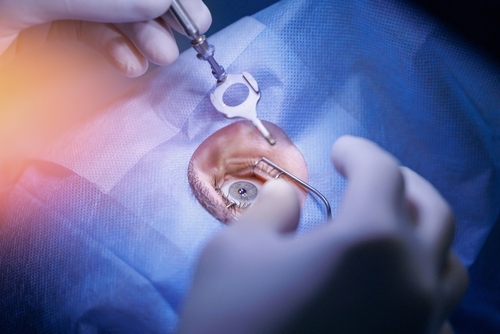
Cataract surgery removes a clouded eye lens, replacing it with an artificial one. During the routine outpatient procedure, eye doctors make a tiny incision before breaking up and removing the cataract. Placing the new artificial lens allows the patient to see clearly. The procedure is low-risk, but following the postsurgical plan is vital for recovery.
Getting Cataract Surgery
Cataracts are a common condition that affects millions of people worldwide. They are a leading cause of blindness and usually affect senior adults. Cataract surgery is the most effective way to treat the condition.
Removing the cloudy lens and replacing it with an artificial one helps to improve the patient’s vision. Recovery is usually uncomplicated, and most people return to their activities within several days.
Postsurgical Medications
Ensure you follow post-procedure instructions and use medications as prescribed. There are eye drops to prevent infections, reduce inflammation, and help with pain or swelling. Get all the medicines you need before the procedure. You can get someone to help you apply the eye drops if necessary.
If using multiple eye drops is challenging, you can find out if you can get a simple drug regimen. Some pharmacies combine eye medications into one compounded formula. Learn the right way to use the eye drops to ensure effectiveness.
Smooth Healing Process
There are things you can do to ensure a smooth healing process after cataract surgery:
Protect your eye by wearing a plastic shield. The shield will protect the eye from dust, debris, and anything that can cause irritation or infection.
Avoid rubbing the eye. Your eye may feel dry and uncomfortable after surgery, but you should resist rubbing. If you feel itchy, use the prescribed eye drops.
Avoid strenuous exercise. In the first month after surgery, you should avoid strenuous activities that can increase pressure in your eye.
Rest as much as possible during the first week after surgery. Activities such as vacuuming, cleaning, and lifting heavy objects can affect healing.
Avoid getting water in your eye the first week after surgery. Water can contain bacteria, while shampoo or soapy water can cause the incision to sting.
Adjusting Your Lenses
Cataracts often affect the eyesight, causing blurriness and other vision changes. Removing cataracts will change your lens prescription. If you received an IOL, you may not even need your eyeglasses.
If one eye still requires vision correction, you can get eyeglasses with one clear lens. You will know how much your vision has improved when the eye heals. The doctor will let you know when you can get new lenses.
Keep Aftercare Appointments
Ensure that you attend all your aftercare appointments after the surgery. The doctor will check your eye to assess whether you are recovering well. Doctors usually schedule the following appointments:
One to two days after surgery.
Seven to ten days after surgery.
Four to six weeks after surgery.
Three to six months after surgery.
If you have cataracts in both eyes, the doctor will schedule surgery a few weeks apart, treating one eye at a time. You will experience vision differences after the first surgery. Give your eyes time to adjust before enjoying your improved vision. Your depth perception may be off immediately after the procedure, but you should be able to read and use the computer.
For more information on cataract surgery, visit Brigham Specialists at our offices in Brigham City, Utah. Call (435) 734-2097 or to book an appointment today.




